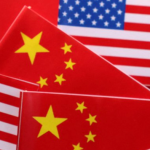By Michael Every of Rabobank
It is said that small minds talk about people, average minds talk about events, and great minds talk about ideas – and I would add the smallest of minds talk about themselves.
The smallest-minded market view is what your individual asset class did yesterday. For example, I see across Bloomberg that ‘equities went up’, ‘bond yields went up’, and ‘oil went up’. No joined-up thinking as to what this means jointly.
The small-minded market view is President Biden telling the CEO of Chevron he was “mildly sensitive” for pointing out to the government how the energy market actually works, as oil rises again.
The average-minded market view is that the White House may cut gasoline taxes for 4 July. Yet even an average market mind should also be able to see this would be bad economics because it won’t help supply, while boosting demand. But careful now, that’s an idea!
The great-minded market view it is to accept what this Daily –and many others– have stressed repeatedly: that to raise rates means huge pain (and I add: and US geopolitical gain); and to cut rates means huge pain (and I add: and US geopolitical loss). There are no good choices. So, cheering equities going up while bond yields and energy also do makes no sense.
However, as Tom Hardy says to Leonardo DiCaprio in ‘Inception’, “Dream a little bigger, darling.”
I recently underlined that central banks have *never* been in real control of inflation. Their inflation-fighting success –or ‘over-success’ pre-Covid, when inflation was “too low”– was *always* reflected the local and global political-economic environments, neither of which they set. One can go back over history to show that fact very simply with a long-run CPI chart for the UK, transposing different local and global backdrops on top.
Or one can ask if a 2% CPI inflation target and ‘anchoring expectations’ were the real drivers of recent central-bank success, or if it was actually decades of globalisation and neoliberal financialization. Surely the current inflation dynamic underlines central banks inability to predict it, control it, or control it without the side effects that have historically prevented such actions happening?
As such, we need to look at both local and external political-economy environments to try to understand what they imply for inflation. This is the realm of both average-minded market views, i.e., events, and great-minded market views, i.e., ideas.
On events, Boris the First is seeing that ‘now is the summer of our discontent’. Railway and transportation strikes are shutting down the UK, with many other public-sector unions threatening to join in. The government, which months ago was talking about raising wages to ‘level up’, and before that was getting people to clap for the public sector on their doorsteps, is now arguing for large real-terms public-sector pay cuts “to fight inflation”. They are also looking to break the strikes by bringing in contract labor; and they are also talking about removing pay and bonus caps for the highest-paid City workers.
What will be key to follow is not just the short-term disruption to GDP and people working from home again. (Read ‘working’, because the sun is out.) Rather, it is if the traditional British (read ‘English’ and ‘Southern’) outrage at this kind of labor unrest sees support for the government grow, or if the public thinks the strikers have the right idea and start asking when they too can get an above-inflation pay-rise too.
That’s just the UK. Yet an article in the Financial Times yesterday posited that anarchy in the West as a whole is far more likely ahead than fascism-round-the-corner that gives progressives fever-dreams. (Relatedly, I was just reading an in-depth article underlining how Iraq is currently operating as a de facto ‘stateless state’.) However, fascist strongmen outside the West should be obvious, even if markets are too small-minded to see it. The echoes of the 1920s and 30s are clear: but are they deflationary, inflationary, or “2% CPI”?
Of course, it all depends on where we go next. Today’s Financial Times op-ed by Martin Wolf mounts a six-point defense of globalization, which he argues has stalled but is not retreating. He starts off noting even IMF research underlines global capital flows do not finance trade, but instead create destabilization and asset bubbles. History shows this to be true. When we had capital controls under Bretton Woods, we didn’t have the problems we do now. Wolf admits this won’t change though, “because markets”. Which is not an encouraging start.
His second point is that globalisation wasn’t an economic catastrophe, but distributed its gains unequally, as financialized capitalism on steroids does. Which is not an encouraging continuation. Not when the third point cherry-picks data to show capital inflows into the US, whose inverse are current-account outflows, were not responsible for its increased income inequality. Sorry, but Pettis and Klein make abundantly clear that is precisely what happened.
Fourth, he says self-sufficiency wouldn’t have protected the world from recent supply-chain disruptions. Of course, *global* problems like Covid by definition impact everyone. Yet did UK shutdowns back in the 70s impact unconnected economies in Asia or Latin America? No. Wolf himself argues for supply chain diversification and carrying higher inventories, both of which mean lower profits and higher costs.
Wolf’s fifth point is the paradox that the countries who drive global trade are most able to walk away from it, i.e., the US, while the smaller states who need trade far more have less influential voices. That overlooks food- and energy-importing China. Worse, it is still not an argument against any potential US neo-isolationism, but an argument for it. Finally, he concludes the WTO still has an important job to do. Are the WTO really an acronym people turn to in a crisis?
Wolf promises next week he will reveal his solution to how we should reshape global trade policy – which by definition means reshaping global capital flows; supply chains; exchange rates; and interest rates. And geopolitics, as some politicians wrap themselves in their flag, some refuse to stand in front of their own national flag, and some hum ‘The Star-Spenglered Banner’.
I just hope it isn’t “42”, but I suspect it will be about as useful.
The point is that there are no good answers as to where we go from here. Not from central banks. They are in the backseat, unless the Fed jumps into the driver’s seat to deliberately crash us into a wall to avoid the car going off a cliff. Not from governments, who are also befuddled by global regime change and have no ideological “-ism” to explain what they should be doing. I still believe this implies a stop-start retreat back towards global mercantilism and great power struggles, or to rival, overlapping blocs; but perhaps Wolf has the answers for us; or anarchy in the UK will reign.
It’s a depressing idea to admit we have no ideas, and hence markets have no idea what inflation will be. However, it’s clearly not a good idea to be taking the smallest-minded of market views and cheering stocks rising as bond yields and oil do too.











